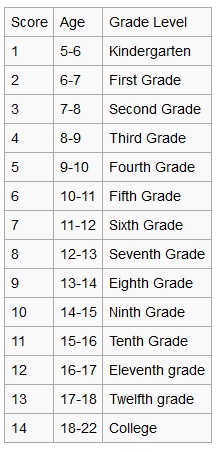The automated readability index (ARI) is a readability test for English texts, designed to gauge the understandability of a text. Like the Flesch–Kincaid grade level, Gunning fog index, SMOG index, Fry readability formula, and Coleman–Liau index, it produces an approximate representation of the US grade level needed to comprehend the text.
The formula for calculating the automated readability index is given below:

where characters is the number of letters and numbers, words is the number of spaces, and sentences is the number of sentences. Sentences were counted by hand as each text was typed.
As a rough guide, US grade level 1 corresponds to ages 6–8. Reading level grade 8 corresponds to the typical reading level of a 14-year-old US child. Grade 12, the highest US secondary-school grade before college, corresponds to the reading level of a 17-year-old.
Unlike the other indices, the ARI, along with the Coleman–Liau, relies on a factor of characters per word, instead of the usual syllables per word. Although opinion varies on its accuracy as compared to the syllables/word and complex words indices, characters/word is often faster to calculate, as the number of characters is more readily and accurately counted by computer programs than syllables. In fact, this index was designed for real-time monitoring of readability on electric typewriters.
If your score ends up at a decimal (example 10.6, or 10.1) always round up, the score should be 11.

-------------------
So how to increase the readability index?
1. make the sentences longer with more compound/complex sentences
2. put more difficult words
Due to the economic growth all around the world, more and more people study wide range of subjects. It is argued that subjects like Science and Technology are regarded as an important subjects rather than History. In this essay, I will discuss both of these subjects and lead my view.
First of foremost, it is true that fewer and fewer people majored in history-related subjects. However, we are capable of learning not only lessons of ancestry but also backgrounds, which students can adapt them in their daily lives, from History subjects. For example, we can understand however nonsense the World War Second was owing to studying the History and we can also pass this experience on our next generation for protecting them from occuring the war again. Therefore, it is necessary to learn History subjects in order to build our moral.
On the other hand, there is much possibility that studying science and technology related subjects have good impact on us. In other words, those who studies Science and Technology subjects are more likely to gain well-paid profession such as google, Facebook and Twitter. Hence, it is inevitable to study Science and Technology subjects to adopt modern society.
In my perspective, there are benefits and handicaps in History subjects and Science-related subjects so that students need to learn both of them and obtain important knowledge respectively.
To conclude, although it is for more beneficial to pursue Science and Technology, students need to balance the time spending on History and Science subjects regardless on their major